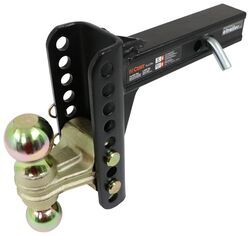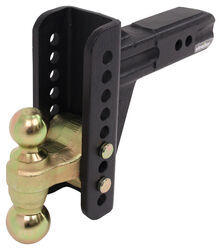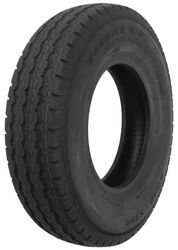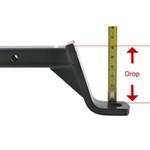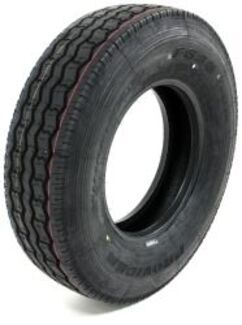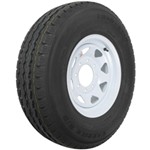
Why Do Rear Tires on Tandem Horse Trailer Run Hotter Than Those on Front Axle
Question:
The rubber on My rear tires on my tandem axel bumper pull stock trailer always seem hotter than the front tires. There’s no smoke and the hubs aren’t hot. The trailer sits a bit high in the front when I pull, could it be I should use a hitch instead of a straight hitch? I pull it with a stick 2007 dodge 3500
asked by: Janice
Expert Reply:
If the tires on the rear axle of your tandem axle horse trailer are running hotter than those on the front axle, this could be due to several possible causes. One of these causes you mentioned; the trailer not being level when hitched.
If the trailer rides nose-high this tends to place more of the trailer's load onto the rear axle. This could easily cause those rear tires to run hotter. All trailers tow best when they are level so if you need to switch ball mounts you can choose one with more drop or use an adjustable one like # C45900 if you have a 2-inch hitch or # C45902 if you have a 2-1/2-inch hitch. To help you choose the right one I linked a helpful article and our main page for adjustable ball mounts.
Other possible reasons for the rear tires running hot are if they are not inflated to the correct cold psi pressure (which is noted on each tire's sidewall), if they are overloaded beyond their weight capacity (either due to the nose-high angle or to them having a different (lower) Load Range Rating than the other tires), or if you drive on them faster than their speed rating allows.
As a general rule all special trailer tires should ALWAYS be inflated to the maximum cold psi pressure noted on the tire sidewall and their weight and speed limits should of course be observed. The tire you referenced, Kenda Karrier # AM10501, has a Load Range Rating "F" (up to 3,960-lbs at 110 psi) and a speed rating "M" (up to 81-mph).

Products Referenced in This Question
Channel Style Adjustable Ballmount - 2" & 2-5/16" Balls - 14,000 lbs
- Trailer Hitch Ball Mount
- Adjustable Ball Mount
- 2 Inch Ball
- 2-5/16 Inch Ball
- Two Balls
- Steel Ball
- Steel Shank - Gloss Black
- Drop - 6 Inch
- Rise - 5 Inch
- Fits 2 Inch Hitch
- 14000 lbs GTW
- Class IV
- CURT
more information >
Curt Adjustable 2-Ball Mount - 2-1/2" Hitch - 6" Drop, 5-1/4" Rise - 20K
- Trailer Hitch Ball Mount
- Adjustable Ball Mount
- 2 Inch Ball
- 2-5/16 Inch Ball
- Two Balls
- Steel Ball
- Steel Shank - Gloss Black
- Drop - 6 Inch
- Rise - 5 Inch
- Fits 2-1/2 Inch Hitch
- 20000 lbs GTW
- Class V
- CURT
more information >
Product Page this Question was Asked From
Karrier ST235/85R16 Radial Trailer Tire - Load Range F
- Trailer Tires and Wheels
- Tire Only
- Radial Tire
- Load Range F
- 235/85-16
- 16 Inch
- M - 81 mph
- Kenda
more information >
Featured Help Information
Miscellaneous Media

Continue Researching
- Q&A: Torque Rating for Spindle Castle Nut
- Q&A: How Tight Does the Castle Nut on a Trailer Spindle Need To Be
- Shop: Bearing Kit, 15123/ 25580 Bearings, 10-36 Seal
- Video: Review of TruRyde 1 Inch Diameter Trailer Spindle Castle Nut - 165686
- Search Results: castle nut
- Search Results: wheel bearing kit
- Shop: Bearing Kit, LM67048/25580 Bearings, GS-2125DL Seal
- Shop: Bearing Kit, LM67048/25580 Bearings, 10-36 Seal
- Shop: Bearing Kit for 1" BT8 Spindle, L44643 Inner/Outer Bearings, 34823 Seal
- Shop: Bearing Kit, 14125A/ 25580 Bearings, 10-36 Seal
- Shop: Spindle Nut for Axles with 7/8" - 14 Castle Nut
- Shop: Trailer Spindle Nut 1"
- Q&A: Rear Axle Hubs of Tandem Axle Gooseneck Trailer Running Hotter Than Front Hubs
- Article: How to Measure for Trailer Hitch Drop
- Search Results: brake shoes
- Search Results: brake kits
- Search Results: brake magnet
- Search Results: trailer brakes
- Search Results: 12 inch brake
- Shop: Suspension Enhancement
- Q&A: Is Replacement Shank Available for Curt Adjustable 2-Ball Channel Mount with 10-3/8" Drop
- Q&A: Highest Load Rating for 235/85-16 Trailer Tire
- Q&A: Tires for a 18,500 Pound Raptor Last About 3 Years and then the Tread Separates
- Q&A: What is Max Safe Tire Temperature
- Video: SumoSprings Solo Rear Helper Springs Review SS28UV
- Video: Curt Lock Set for Adjustable Channel-Style Mounts Review
- Video: Curt Adjustable 2-Ball Mount Review C45902
- Video: Timbren Rear Suspension Enhancement Installation - 2021 Ram 2500
- Video: Timbren Rear Suspension Enhancement Installation - 2019 Ram 2500
- Video: Review of Taskmaster Trailer Tires and Wheels - Wheel Only - TA65VR



